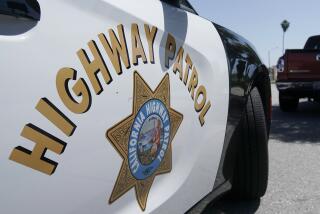CHP Investigating Officers Who Left Ill Woman in Car
- Share via
YORBA LINDA — Two California Highway Patrol officers may have violated department policy when they left an ill woman in her car beside the Riverside Freeway, a CHP spokesperson said. She died in the car two hours later.
The CHP officers could face discipline if they are found to have violated the rule that normally bars officers from leaving people on the freeway, CHP spokesman Angel Johnson said.
The officers discovered Kirsten Harrington, 43, of Cypress in her Mazda on the freeway shoulder near Coal Canyon Road about 2 a.m. Monday, Johnson said.
Harrington had vomit on her clothes, and the officers said she was alive, Johnson said. But Johnson did not know whether Harrington was conscious or spoke to the officers.
“For whatever reason--I don’t know what reason--they got back in their car and left,” Johnson said.
A tow truck driver who stopped to check the car about 5:30 a.m. notified authorities when he could not wake her, Johnson said. Paramedics found her dead. Investigators at the Orange County coroner’s office said Harrington died of a brain aneurysm about 4 a.m.
Aneurysms are weakened artery walls caused by disease or aging that can rupture and spur fatal hemorrhaging.
Deputy Chief Coroner Kurt Murine said Wednesday that Harrington’s brain hemorrhage may have occurred minutes or hours before the estimated time of death, making it impossible to determine Harrington’s condition when the officers checked her.
The case angered survivors of brain aneurysms, who said Harrington showed classic signs of having had such an attack, and they called for more training to help police recognize them.
“This is the same kind of case as happened with epileptics a decade ago who were thrown in the tank as drunks because too many cops didn’t know the difference,” said Jay Murley, president of the Newport Beach-based Brain Aneurysm Survivors of North America, which has 22 members.
Murley said he had symptoms like Harrington’s when he suffered an aneurysm in late 1992.
It was unclear what the CHP officers concluded when they checked on Harrington.
Under a 1986 CHP policy, an officer must stay with anyone on the side of the freeway unless replaced, called away to a bigger emergency or no longer needed for help or protection.
But the CHP policy concludes: “Nothing in this order shall be construed as requiring an officer to remain with a disabled motorist or other person after all reasonable steps have been taken to resolve the incident, so long as there exists no foreseeable danger to the individual or other traffic.”
The policy is based in part on court cases that refined the definition of an officer’s “special relationship” with people who could be in danger. In some instances, California courts have found officers may be liable for failing to protect motorists they have stopped to help or investigate.
Johnson said she did not know whether the officers, who have been interviewed by internal investigators, had been ordered elsewhere at the time.
The officers, who were not identified, will remain on duty during the CHP investigation, which is expected to take two weeks, Johnson said.
More to Read
Sign up for Essential California
The most important California stories and recommendations in your inbox every morning.
You may occasionally receive promotional content from the Los Angeles Times.













